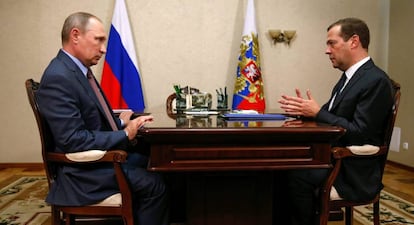Why Do Dictators like to Appear Democratic?
Democracy contributes the most precious ingredient for tyrants: legitimacy

An interesting paradox of contemporary world politics is the extraordinary contortions that some autocrats take in order appear democratic. Why do so many dictators construct elaborate democratic theatrics even though they know that sooner or later the authoritarian nature of their regime will be revealed?
Some of the reasons are very obvious while others are not. The most obvious is that, increasingly, political power is obtained – at least initially – by votes and not by bullets. Therefore, aspirants must show great devotion to democracy, even if that is not their preference. The other reason behind the current popularity of fictitious democracies is less evident: today’s dictators feel more vulnerable. They know to be afraid of the powerful combination of street protests and social media. This flammable mixture of “hot streets” and incendiary social networks does not sit well with dictatorships. Maybe that’s why keeping up a democratic front bolsters their power.
This flammable mixture of “hot streets” and incendiary social networks does not sit well with dictatorships
Democracy contributes the most precious ingredient for tyrants: legitimacy. A government that originates from the will of the people is a more legitimate government and, therefore, less vulnerable than a regime whose power depends on repression. Thus, although they are fraudulent, democracies generate some legitimacy, even if it is transitory.
Vladimir Putin's Russia is a good example of all this. The tricks to which he has resorted to make his government seem democratic are extraordinary. Russia today has all the institutions and rituals of a democracy. But it is a dictatorship.
Of course there are elections in Russia periodically. And these are accompanied by expensive media campaigns, marches, rallies, and debates. On Election Day, tens of millions of people make long lines to vote. The small detail is that since 2000 Putin always wins… or the person he designates to keep the position for him until his next turn as president arrives.
That happened in 2008 when Dmitri Medvedev, Putin’s prime minister, won the presidential election and immediately gave his former boss the post of prime minister. During Medvedev’s tenure there was never any doubt as to who was really in command. After his presidential term, there were elections and, of course, the “new” president-elect was...Vladimir Putin. Thus, the power of the presidency and the real power were aligned once more. Obviously, maintaining the appearance that power changes hands in the Kremlin is very important to Putin.
The tricks to which Putin has resorted to make his government seem democratic are extraordinary
But why? Instead of going through all this trouble, why doesn’t Putin just take the mask off and come clean? That would save him from having to abuse the resources of the state to achieve insurmountable advantages over his rivals in the elections and use all sorts of tricks.
Removing the mask would not be difficult. No one would be surprised, for example, if Putin called a referendum to indefinitely extend his term and he won (by an overwhelmingly majority, as always). Nor would it surprise anyone if the Parliament and the Supreme Court endorsed the president’s maneuver to keep himself in power. After all, both institutions are fundamental elements of the artificial democratic facade behind which the Russian autocracy is hidden. In 17 years they have not once prevented Putin from doing what he wants.
Russia is not the only dictatorship that wants to appear like a democracy. Recently the Chinese authorities indicated their clear preference for the fate of Syria: “We believe that the future of Syria should be left in the hands of the Syrian people themselves. We respect the Syrian people’s choice of their own leaders and development path.” It is curious to see a dictatorship advising another dictatorship to let the people decide their fate. In fact, as Isaac Stone Fish, a journalist who spent seven years in China, points out: “One of China’s Communist Party Secretary Xi Jinping’s favorite slogans refers to the 12 ‘core socialist values’ – of which democracy is second only to national prosperity.” Stone Fish also says that at a conference he attended, several leaders of the Chinese Communist Party insisted that, just as with the United States, “China can accurately and credibly be called a democracy.”
Democracy is a brand that has become fashionable
The Syrian Government asserts the same, while North Korea defines itself as the Democratic People’s Republic. Nicolás Maduro, Daniel Ortega, and Raúl Castro also argue that their repressive regimes are democracies.
Obviously, democracy is a brand that has become fashionable. This was not always so. In the 1970s, for example, dictators from Latin America, Asia, and Africa did not seem to care much about appearing to be democrats. Perhaps because they felt safer than the dictators of today.
Follow us on Twitter @moisesnaim
Tu suscripción se está usando en otro dispositivo
¿Quieres añadir otro usuario a tu suscripción?
Si continúas leyendo en este dispositivo, no se podrá leer en el otro.
FlechaTu suscripción se está usando en otro dispositivo y solo puedes acceder a EL PAÍS desde un dispositivo a la vez.
Si quieres compartir tu cuenta, cambia tu suscripción a la modalidad Premium, así podrás añadir otro usuario. Cada uno accederá con su propia cuenta de email, lo que os permitirá personalizar vuestra experiencia en EL PAÍS.
¿Tienes una suscripción de empresa? Accede aquí para contratar más cuentas.
En el caso de no saber quién está usando tu cuenta, te recomendamos cambiar tu contraseña aquí.
Si decides continuar compartiendo tu cuenta, este mensaje se mostrará en tu dispositivo y en el de la otra persona que está usando tu cuenta de forma indefinida, afectando a tu experiencia de lectura. Puedes consultar aquí los términos y condiciones de la suscripción digital.









































